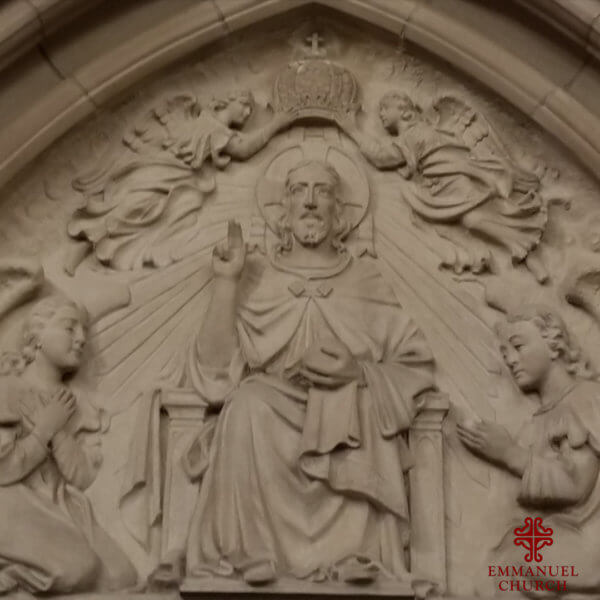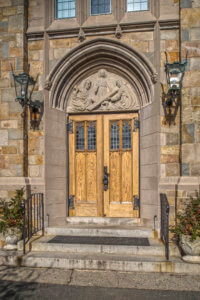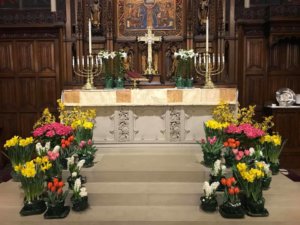
God Is In the Details
 Friends, your Reopening Planning Group has been hard at work this week, preparing plans for Emmanuel’s reopening. Emmanuel, along with the Diocese of Rhode Island, is reopening in phases, all in accordance with the State of Rhode Island’s phased reopening plan. The Diocese of Rhode Island is basically following the State’s reopening plan, and Emmanuel is — for the most part — following the Diocese’s plan. But we are also taking into account the particular needs and circumstances of our own community and location.
Friends, your Reopening Planning Group has been hard at work this week, preparing plans for Emmanuel’s reopening. Emmanuel, along with the Diocese of Rhode Island, is reopening in phases, all in accordance with the State of Rhode Island’s phased reopening plan. The Diocese of Rhode Island is basically following the State’s reopening plan, and Emmanuel is — for the most part — following the Diocese’s plan. But we are also taking into account the particular needs and circumstances of our own community and location.
This is tough, compassionate, holy, loving work. True, it’s made up of a lot of detail — epidemiological data, square footage, viral retention statistics, disinfectant ratings — but even those mundane-sounding words are the holy elements of preparation for the hospitality that is the very bedrock of our Christian community.
Famous columnist, former political speechwriter, and philologist William Safire, spent his career exploring the origin of words and common sayings. He pretty much hit the wall in a column in The New York Times Magazine in 1989, when researching the common phrase God is in the details. Safire asserted some weak arguments for Frederick Nietzsche, as well as some evidence for German Bauhaus architect Ludwig Mies van der Rohe, but ultimately abandoned the verbal quest in favor of a close examination of the word details itself. And yet, we know this is true: God inhabits, surrounds, involves, unifies, and gives purpose to and through the details.
Hospitality
 And it has always been so for us. Hospitality, our basic foundation as Christians, IS the holy work of details that it takes to prepare lovingly to gather in Jesus’ name. Paying careful attention to the details is always what we do to prepare for worship. We have always carefully polished our patens that hold our communion wafers, chalices and cruets for our wine, and our candlesticks. We have always starched and ironed our altar cloths and meticulously placed the frontals, choosing our colors for the seasons in the church year that remind us of different times in Jesus’ life, passion, and resurrection. We have always prepared and proofread our service bulletins, getting ready to welcome our community, our neighbors, and the stranger. So all these new science-y, epidemiological-sounding COVID protocols are just our new ways of being in loving, caring Christian community — of preparing for our worship together.
And it has always been so for us. Hospitality, our basic foundation as Christians, IS the holy work of details that it takes to prepare lovingly to gather in Jesus’ name. Paying careful attention to the details is always what we do to prepare for worship. We have always carefully polished our patens that hold our communion wafers, chalices and cruets for our wine, and our candlesticks. We have always starched and ironed our altar cloths and meticulously placed the frontals, choosing our colors for the seasons in the church year that remind us of different times in Jesus’ life, passion, and resurrection. We have always prepared and proofread our service bulletins, getting ready to welcome our community, our neighbors, and the stranger. So all these new science-y, epidemiological-sounding COVID protocols are just our new ways of being in loving, caring Christian community — of preparing for our worship together.
We’re figuring out how we can start back with in-person liturgy. And liturgy is a great word to use in this context. Liturgy means — simply — a rite or body of rites used for public worship. The word liturgy comes to us from Greek through Latin, and referred to public duty or office — originally by a wealthy Athenian for the good of the public. Over the centuries, liturgy was almost always used to refer to our worship — like a service of Morning Prayer or Holy Eucharist. Or Baptism. Or Holy Matrimony.
No Detail is too Mundane
 In our worship services, all of us — clergy, altar guild, lectors, intercessors, ushers, choir — all of us have a role or a part in this duty or office. As we understand and use the word liturgy now, it has come to mean the work of the people in our worship — the way we express, reinforce, and continually recommit ourselves to our lives of following Jesus. There are two points here: First, no detail is too simple — too ordinary or too mundane — to be important and holy in preparing for our liturgy. AND second, we all have a part. For our whole lives in the church, we have washed, polished, ironed, starched, cooked, cleaned, and waxed. We have ordered candles, communion wafers, poinsettias, palms, and Easter lilies, and coffee by the ton almost — always making sure we had enough for all of us. Now we are using the same compassion as we prepare to meet in person again.
In our worship services, all of us — clergy, altar guild, lectors, intercessors, ushers, choir — all of us have a role or a part in this duty or office. As we understand and use the word liturgy now, it has come to mean the work of the people in our worship — the way we express, reinforce, and continually recommit ourselves to our lives of following Jesus. There are two points here: First, no detail is too simple — too ordinary or too mundane — to be important and holy in preparing for our liturgy. AND second, we all have a part. For our whole lives in the church, we have washed, polished, ironed, starched, cooked, cleaned, and waxed. We have ordered candles, communion wafers, poinsettias, palms, and Easter lilies, and coffee by the ton almost — always making sure we had enough for all of us. Now we are using the same compassion as we prepare to meet in person again.
I know it could be easy to get distracted by some of the practices we need to follow to keep each other safe. It could even seem like face masks and hand sanitizer don’t have much to do with worship — or that they even interfere with worship. It could seem like these are extraneous, unrelated, secular details — kind of unholy and worldly.
But when I think of the things we’ve always done our whole lives in the church, the face masks, symptom checks, hand sanitizer, and procedures are just part of our liturgy — the work of all of us in our public worship. When you think of it that way, the mundane details of face masks, signage, physical distancing, and hand sanitizer aren’t really any different from the ordinary details of washing, polishing, ironing, starching, and waxing that we always undertake when we prepare to be both hosts and guests as we welcome each other and Jesus among us. We are balancing hospitality and each other’s health risk, carefully and respectfully calibrating our plans with overflowing measures of love and compassion.
The Work of the People
 Our gospel today points us to this work of the people. Jesus and the twelve apostles are headed out on a mission, preaching and teaching in all the villages of the Galilee. Jesus summons the apostles, gives them the power to heal the sick and cast out unclean spirits, and then sends them out together to do their work. Jesus’ instructions are really interesting. He told them to take nothing with them but the sandals on their feet and just what they’re wearing that day — no food, no money, no extra clothes, and — this is big — no bag to carry anything in. These are remarkably and specifically clear instructions. And then the last one is a zinger: Jesus tells the apostles that when they enter a house, they should stay there until they leave.
Our gospel today points us to this work of the people. Jesus and the twelve apostles are headed out on a mission, preaching and teaching in all the villages of the Galilee. Jesus summons the apostles, gives them the power to heal the sick and cast out unclean spirits, and then sends them out together to do their work. Jesus’ instructions are really interesting. He told them to take nothing with them but the sandals on their feet and just what they’re wearing that day — no food, no money, no extra clothes, and — this is big — no bag to carry anything in. These are remarkably and specifically clear instructions. And then the last one is a zinger: Jesus tells the apostles that when they enter a house, they should stay there until they leave.
Hmm. Now that’s fascinating. Let’s unwrap that a bit. Jesus and the apostles go out into the villages of the Galilee — remember they took no food, no money, no extra clothes, and no bag to carry anything in. What they did have, though, was this clear instruction from Jesus: stay there until you leave. Was Jesus leaving space for liturgy — the work of the people?
If the apostles arrive empty-handed and are present with their full attention until it’s time to go, there is a role left for the people they visit. Everyone gets involved. If the apostles don’t come full of their own ideas, with an answer for everything, holding onto their own foods, their own money, and their own culture — and with somewhere else they have to be — they leave space. If they arrive empty-handed, without even a bag to carry their own things with them from home, they leave room for good things to happen, for the liturgy — the work of the people — they will do together, and for relationship and faith to grow. By coming empty-handed, and staying put in the community, there’s work for everyone to do together. There’s space for community, there is space for mutuality and relationship, for respect to grow and flourish, and there is space for God.
As we prepare to reopen for in-person worship in these next weeks and months, our reentry will be phased. We’ll start where it’s safest for everyone — outdoors, where the air moves around. We’ll also continue live-casting on Facebook, so we can include anyone who has joined us over these last months from other places — or anyone who just feels safer and more comfortable, for now at least, joining us from home.
All of us have a role and a place in our lives together at Emmanuel. Whether we are polishing our communion silver and starching and ironing our altar linens — or gathering face masks, putting out hand sanitizer, and planning check-in procedure — we are doing the holy work we always do when we prepare to be both hosts and guests and welcome each other and Jesus among us. We are doing the work of God. Amen

